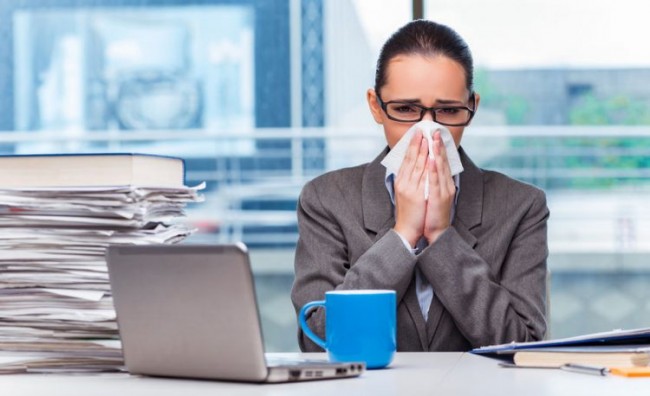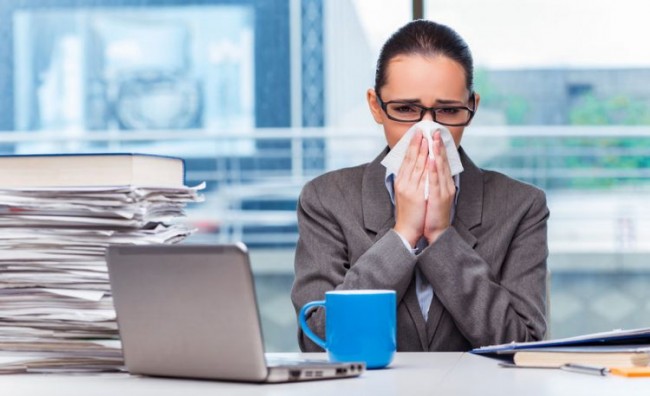People are spending too much time indoor in an office space as most work requires the use of computers. This is not a normal human behaviour. Humans have throughout history, spent most of work hours outdoors either in the form of hunting and gathering, or in agriculture, or in other related arts and trade.
But the workspace and environment have irrevocably altered for most. Spending time indoors under artificial lights sitting on a table and chair with eyes glued to a computer screen is a novel human experience that our bodies have not yet evolved to.
Let us see the health risks of our office space , and how we can manage them.
Sitting in Cubicle :
In the last few decades there have been innovations in design to increase the office space and squeeze in maximum workers in a minimum area. The use of a cubicle has become the norm. But for most workers, cubicle even though gives privacy, is not a pleasant workspace. The lack of windows and lack of access to natural light is stressful. Studies have shown that access to windows and outside view is healthy for our mental and physical health. In one study, a patient with a window room facing out recovered much faster than the patients with no view from the window.
If you have a cubicle, then put some pictures of nature like mountains, waterfall, ocean on the wall. Photos of family and friends are good too. Make sure to go and walk out of the cubicle periodically. Stand outside the building to soak in some natural light. It helped in reducing eye fatigue, and stress.
Indoor Air pollution:
Modern buildings are designed in such a way that we cannot open windows. The United States has one of the purest air among nations. Yet people are breathing stale indoor air.
Stale office air breeds harmful bacteria which pose serious health hazards. These dangerous pathogens have been linked to allergy, depression, malaise and can lower immunity. You can keep the air fresh by using indoor plants. Good indoor plants for air purification are Garden Mum, Boston Fern, Dracaena, Peace Lily, Bamboo Palm, Ficus Fig, Rubber plant, Aloe Vera, Dwarf Date Palm, and Lady Palm. Another option is to use the Himalayan salt lamp. When the lamp burns, it emits salty air mist which acts as an air purifier. Then there are commercial air purifiers available, albeit costly, but worth trying. Schedule frequent fresh air breaks.
Allergy from the carpet:
Most office spaces have carpets that are vacuumed once a week and in some offices, once a month. Rarely every day. I see patients from all walks of life. They bring dirt and debris off the ground through their shoes, which accumulate on the carpet. It is a healthy habit to get a small portable vacuum cleaner, HEPA filter, and vacuum your workspace at least 2-3 times a week. Talk with your manager and see if the carpet can be professionally cleaned or shampooed once a month.
4. Sitting at Work:
Sitting is as bad as smoking for your health. Stand and move. Consider getting a standing desk. Hold standing minutes. Move. Sitting on a table and chair is an unnatural posture for the human spine. Natural positions are standing, squatting, lying flat, sitting cross-legged on the floor. I use a standing desk for my work. When I get tired, I sit on the chair for a while. Then I bring the laptop on the floor and sit cross-legged. Prolonged standing and sitting both are unhealthy. The key is to change the posture, to stimulate blood and lymph circulation. I try to change my posture throughout the day. This mobility has got rid of my back pain, neck pain, wrist pain.
Dehydration:
All professional offices stay at a constant artificially regulated temperature. At all times, either the air conditioning or the heating is on. The artificial temperature control continually is unhealthy for the body but good for work efficiency. Constant thermo regulation increases the risk of weight gain, as the body cannot use the stored fat to generate the heat. Also, it causes dehydration and dryness of the skin. Keep on drinking water, fluids all day. Remain hydrated. Many times, stress, anxiety, tiredness, and fatigue are merely due to lack of water. Stay away from soda and commercial juices. Drink filtered water with a pinch of sea salt for better hydration. Herbal tea, yogurt, homemade juices, shakes, probiotics drinks are good choices.
Nutrition:
When we spend 8 to 10 hours at a place, we have to eat there too. Most people have their lunch and snacks at work. The food served in most cafeterias are unhealthy. Although laborious, the best practice is to bring your lunch from home. Try to pack meals from home if possible. But with a busy schedule, it is not always feasible. One way to solve this is to cook in bulk during the weekend and free small portions in zip lock bags. You can use them for meals during lunch. Try to stay away from frozen ready to eat meals sold at the stores. They are laden with preservatives and devoid of nutrients. I frequently make smoothies the previous night with nuts, yogurt, fruits, in a blender and bring them to work the next day.
Blue Light Toxicity:
Most of the work is done on the computers, laptop, use Microsoft PowerPoint, excel, etc. this all involves staring at the screen. The screen emits light which is different from the full spectrum light out eyes are used to like the natural daylight. The blue light is injurious to the eyes and t the retina. It Can cause ocular atrophy and macular degeneration. Since work on screen is inevitable for most, there are ways to balance the blue light. One easy way is to turn the computer into night mode or increase the display to more towards reddish spectrum. There is a software called f.lux which will do this for me at scheduled hours. It is free to download, and I recommend it for many. Another step will be to use blue light blocking glasses. These are glasses with an orange or red hue, are inexpensive, and readily available online. Another way will be to use a red or infrared lamb in the room which will give out light in the red spectrum and neutralize the blue.
Sleep problems:
Spending time indoors sitting on a desk in front of a computer is a risk factor for insomnia. It is important that when you come home, go out for a walk or jogging. Spend some time outdoors as long as weather permits. Keep your room temperature lower than that of office temperature for better sleep.
Many companies permit their workers to work from home. It can solve some of the above problems but can create new ones. The space between workspace and home space gets blurred. Unless one draws boundaries, you remain connected 24 x 7 with your work with no breaks. Besides, work from home is also associated with travelling out of state. Travel for vacation is fun and healthy; a trip for work can be stressful. But work is indispensable. Try to work efficiently and become more skilled at your task so that you do not have to spend any more time than you need to at work. Also look for ways to enjoy your work and follow healthy practices to mitigate some of the work related stressors. To learn more about how to manage stress at work and home, read Dr.Paul’s book Stress Rescue.
*Dr. Panchajanya Paul, MD, ABIHM, ABPN, FAPA – is an American Board certified – Child, Adolescent, and Adult Psychiatrist. He is the author of 2 books- Stress Rescue & Sleep Coaching available at Amazon. He practices Psychiatry in Atlanta, GA.







